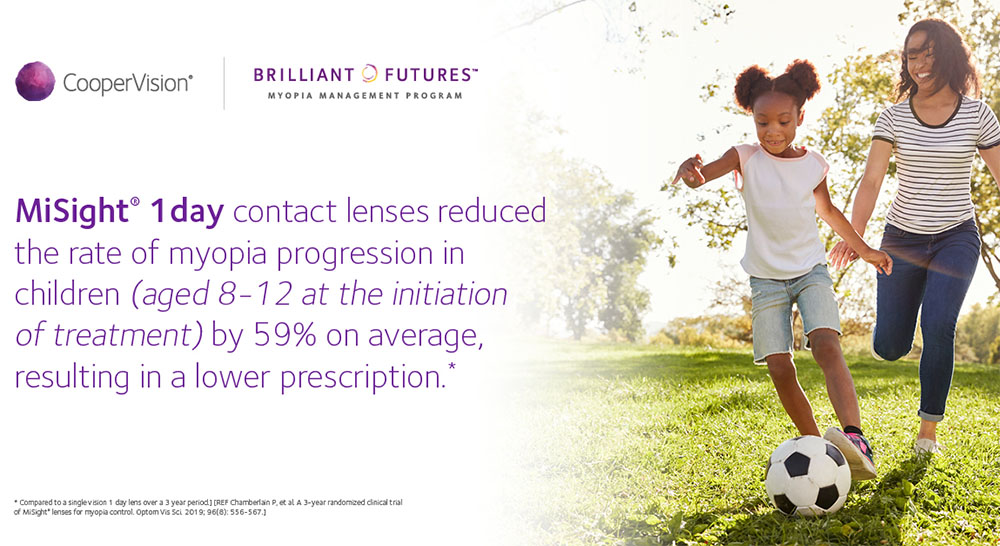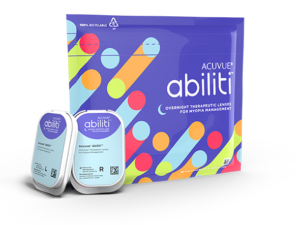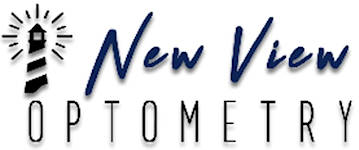What causes myopia?
Myopia, or near-sightedness, is on the rise in the U.S. and worldwide. In the U.S. alone myopia rates have risen to over 40%. Not only are more people myopic, but they have higher prescriptions than people had in previous decades. This is an epidemic and research is currently underway to discover why myopia is on the rise and how we can stop it. Both genetics and environmental factors affect if someone becomes myopic. If one parent of a child is myopic, that child is 3x more likely to be myopic. If both parents are myopic, that child is almost 6x more likely to be myopic. Environmental factors such as excess near activities (computers, tablets, smartphones) as well as limited time outdoors also affect the likelihood of becoming myopic.

Why try to control myopia?
The average rate of myopia progression in a child is 0.50 diopters per year. Some children progress at a much faster rate of 1.00 diopters or more each year. Once a myopia prescription reaches 6.00 diopters, that person is at a significantly higher risk of developing sight-threatening eye conditions such as cataracts, glaucoma and retinal detachments. We want to limit the chance of a child being at a higher risk for these conditions in adulthood. There is also the cost-burden associated with higher prescriptions. Once a myopia prescription reaches certain levels, specialty lens materials are necessary to provide comfortable vision in glasses. And some people need specialty contact lenses as well for their higher prescriptions. Finally, we want to slow down the progression of myopia to improve overall quality of life.
What are treatments to control myopia?
Thankfully there is research that has demonstrated that myopia control treatment programs are effective. On average, the studies have shown about a 50% reduction in myopia progression. There are several different treatment options including atropine drop therapy, daytime soft contact lens therapy and over-night orthokeratology (or corneal reshaping therapy). Other treatment options are currently in the clinical trial phase and we plan to closely monitor when these treatments are available to provide our patients with the most current technology as soon as possible.
MiSight 1 day soft contact lenses are the first FDA-approved method using soft lenses to slow the progression of myopia in the United States. The recently concluded clinical trial demonstrated 59% reduction in myopia progression in children aged 8-12 years.
 Dr. Schirner has always been passionate about the importance of slowing the progression of myopia in her pediatric patients and she has been fitting patients in Ortho-K lenses for 10+ years. She herself is myopic and is excited to share new technology with her patients as improvements continue to be made. “As a kid I would have loved the freedom of not having to wear my glasses or contacts during the day.” She is certified to fit and dispense numerous specialty lenses including Acuvue’s Abiliti lenses. Abiliti is the first (and currently the only) FDA approved Ortho-K lens for Myopia Management.
Dr. Schirner has always been passionate about the importance of slowing the progression of myopia in her pediatric patients and she has been fitting patients in Ortho-K lenses for 10+ years. She herself is myopic and is excited to share new technology with her patients as improvements continue to be made. “As a kid I would have loved the freedom of not having to wear my glasses or contacts during the day.” She is certified to fit and dispense numerous specialty lenses including Acuvue’s Abiliti lenses. Abiliti is the first (and currently the only) FDA approved Ortho-K lens for Myopia Management.
